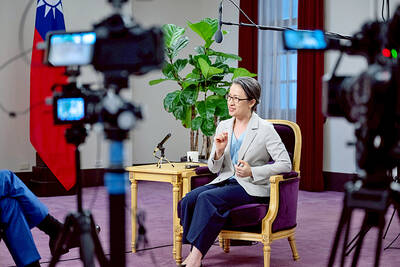Jay Chou (周杰倫) was the most popular singer in Taiwan on two major music streaming platforms — Spotify and Line Music — last year.
Chou’s songs were the most-streamed in Taiwan on Spotify last year, beating counterparts from South Korea, the UK and Hong Kong.
Since launching his first album — Jay — in 2000, Chou, 41, has released 43 albums.
He has won many honors, including best male Mandarin singer, best composer, best producer and best album of the year, at the Golden Melody Awards, Taiwan’s version of the Grammy Awards.
South Korean pop group BTS, which entered the Taiwanese market in 2014, were in the second spot on Spotify’s list.
Taiwanese singer Jolin Tsai (蔡依林), British singer Ed Sheeran and Hong Kong’s Gloria Tang (鄧紫棋), also known as GEM, placed third, fourth and fifth respectively.
Among the top five Taiwanese singers or groups on Spotify’s list, Chou ranked first, followed by Tsai, Taiwanese band Mayday (五月天), Eric Chou (周興哲) and rapper OSN Gao (高爾宣).
In terms of the most popular pop groups in Taiwan regardless of nationality, BTS topped the Spotify list, ahead of Mayday, Taiwanese independent band EggPlantEgg (茄子蛋), California rock band Maroon 5 and hip-hop group MJ116 (頑童).
Spotify’s most-streamed albums in Taiwan were OSN’s #osnrap, Tsai’s Ugly Beauty (怪美的), Canadian singer Shawn Mendes’ eponymous album, Sheeran’s No. 6 Collaborations Project and US singer-songwriter Billie Eillish’s When We All Fall Asleep, Where Do We Go?
As for Line Music, which entered the local market in July last year, Jay Chou also topped its list as the most popular male singer in Taiwan, ahead of Singapore’s J.J. Lin (林俊傑) and Eric Chou, and Taiwan’s Hsiao Huang-chi (蕭煌奇) and Nine Chen (陳零九).

China might accelerate its strategic actions toward Taiwan, the South China Sea and across the first island chain, after the US officially entered a military conflict with Iran, as Beijing would perceive Washington as incapable of fighting a two-front war, a military expert said yesterday. The US’ ongoing conflict with Iran is not merely an act of retaliation or a “delaying tactic,” but a strategic military campaign aimed at dismantling Tehran’s nuclear capabilities and reshaping the regional order in the Middle East, said National Defense University distinguished adjunct lecturer Holmes Liao (廖宏祥), former McDonnell Douglas Aerospace representative in Taiwan. If

TO BE APPEALED: The environment ministry said coal reduction goals had to be reached within two months, which was against the principle of legitimate expectation The Taipei High Administrative Court on Thursday ruled in favor of the Taichung Environmental Protection Bureau in its administrative litigation against the Ministry of Environment for the rescission of a NT$18 million fine (US$609,570) imposed by the bureau on the Taichung Power Plant in 2019 for alleged excess coal power generation. The bureau in November 2019 revised what it said was a “slip of the pen” in the text of the operating permit granted to the plant — which is run by Taiwan Power Co (Taipower) — in October 2017. The permit originally read: “reduce coal use by 40 percent from Jan.

‘SPEY’ REACTION: Beijing said its Eastern Theater Command ‘organized troops to monitor and guard the entire process’ of a Taiwan Strait transit China sent 74 warplanes toward Taiwan between late Thursday and early yesterday, 61 of which crossed the median line in the Taiwan Strait. It was not clear why so many planes were scrambled, said the Ministry of National Defense, which tabulated the flights. The aircraft were sent in two separate tranches, the ministry said. The Ministry of Foreign Affairs on Thursday “confirmed and welcomed” a transit by the British Royal Navy’s HMS Spey, a River-class offshore patrol vessel, through the Taiwan Strait a day earlier. The ship’s transit “once again [reaffirmed the Strait’s] status as international waters,” the foreign ministry said. “Such transits by

Taiwan is doing everything it can to prevent a military conflict with China, including building up asymmetric defense capabilities and fortifying public resilience, Vice President Hsiao Bi-khim (蕭美琴) said in a recent interview. “Everything we are doing is to prevent a conflict from happening, whether it is 2027 or before that or beyond that,” Hsiao told American podcaster Shawn Ryan of the Shawn Ryan Show. She was referring to a timeline cited by several US military and intelligence officials, who said Chinese President Xi Jinping (習近平) had instructed the Chinese People’s Liberation Army to be ready to take military action against Taiwan